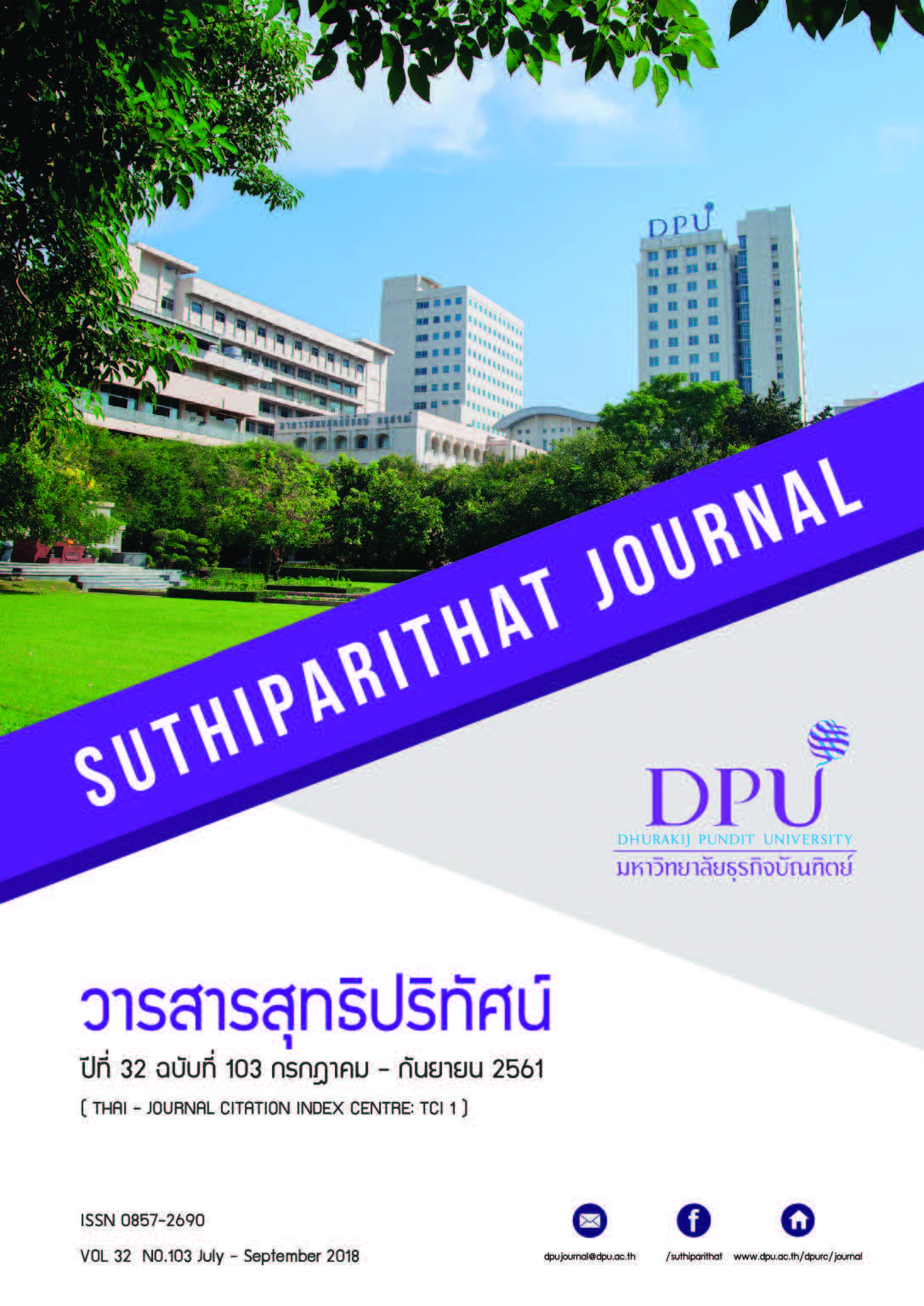ปัจจัยความสำเร็จและความยั่งยืนของธุรกิจเพื่อสังคมในการท่องเที่ยวโดยชุมชนในประเทศไทย
คำสำคัญ:
ปัจจัยความสำเร็จ, การท่องเที่ยวโดยชุมชน, กิจการเพื่อสังคม, ความยั่งยืนทางธุรกิจบทคัดย่อ
ธุรกิจเพื่อสังคมการท่องเที่ยวโดยชุมชนในประเทศไทยมีจำนวนหนึ่งที่ถือได้ว่าประสบความสำเร็จ แต่ปัจจัยความสำเร็จนั้นยังไม่ทราบแน่ชัดทางวิชาการ การศึกษานี้จึงมีวัตถุประสงค์เพื่อระบุปัจจัย ความสำเร็จที่สำคัญและความยั่งยืนของธุรกิจเพื่อสังคมการท่องเที่ยวโดยชุมชนในประเทศ การศึกษานี้มี กลุ่มตัวอย่างคือผู้มีส่วนได้ส่วนเสียของธุรกิจเพื่อสังคมการท่องเที่ยวโดยชุมชนใน 4 ชุมชนทั่วประเทศไทย จำนวน 350 คน เก็บข้อมูลโดยใช้แบบสอบถาม และการสัมภาษณ์แบบมีโครงสร้าง วิเคราะห์ข้อมูลโดย ใช้สถิติเชิงพรรณนา การวิเคราะห์แก่นสาระ (Thematic Analysis) และการวิเคราะห์องค์ประกอบเชิงยืนยัน ผลการศึกษาพบปัจจัยความสำเร็จสำคัญ 3 ประการที่เป็นลักษณะร่วมของทุกชุมชน ได้แก่ 1) ความเป็นผู้นำ 2) ความเป็นของแท้และมีอัตลักษณ์ และ 3) การมีส่วนร่วมในการบริหารจัดการและการเป็นเจ้าของธุรกิจของภาคีการท่องเที่ยว ปัจจัยแห่งความสำเร็จเหล่านี้จึงควรนำมาพิจารณาในการบริหารจัดการและ การพัฒนาธุรกิจเพื่อสังคมการท่องเที่ยวโดยชุมชนอื่น เพื่อนำไปสู่ความสำเร็จและความยั่งยืนทางธุรกิจต่อไป
เอกสารอ้างอิง
Arbuckle, J. L. (1995). AMOS for Windows Analysis of Moment Structures. Version 3.5. Chicago:Small Waters Corp.
Breugel, L. V. (2013). Community-based tourism: Local participation and perceived impacts a comparative study between two communities in Thailand. (Master Thesis). Netherlands: Radboud University Nijmegen. Retrieved October 12, 2016, from www.ru.nl/publish/pages/657546/hesis_liedewij_van_breugel_scs.pdf.
Byrne, B. M. (2001). Multivariate applications book series. Structural equation modeling with AMOS: Basic concepts, applications, and programming. Mahwah, NJ, US: Lawrence Erlbaum Associates Publishers.
Carmines, E. G., & McIver, J. P. (1981). Analyzing Models with Unobserved Variables: Analysis of Covariance Structures. In G. W. Bohrnstedt, & E. F. Borgatta (Eds.), Social Measurement: Current Issues (pp. 65-115). Beverly Hills: Sage Publications, Inc.
Carlson, M., & Mulaik, S.A. (1993). ‘Trait ratings from descriptions of behavior as mediated by components of meaning’, Multivariate Behavioral Research, 28(1), 11-59.
Dyllick, T., & Hockerts, K. (2002). Beyond the business case for corporate sustainability. Business Strategy and The Environment, 11, 130–141.
Financial Times Lexicon. (2017). Definition of business sustainability. Retrieved January 20, 2016, from http://lexicon.ft.com/Term?term=business-sustainability.
Ford, J.K., MacCallum, R.C., & Tait, M. (1986). The application of exploratory factor analysis in applied psychology: A critical review and analysis. Personnel Psychology, B(2), 291- 314.
Global Reporting Initiative. (2015). Sustainability and Reporting Trends in 2025 – Preparing for the Future – GRI’s Reporting 2025 Project: First Analysis Paper. Retrieved October 1, 2016, from https://www.globalreporting.org/resourcelibrary/Sustainability-and-Reporting-Trends-in-2025-1.pdf
Goodwin, H and Santilli, R. (2009). Community-based tourism: A success? ICRT Occasional Paper 11. Retrieved October 30, 2016 from http://www.icrtourism.org/documents/OP11merged.pdf
Goodwin, H. (2006). Community-based tourism failing to deliver? ID 21 Insights (62). London:Department for International Development.
Guest, G. (2012). Applied thematic analysis. Thousand Oaks, California: Sage.
Hair, J.F., Black, W.C., Babin, B.J., Anderson, R.E., & Tatham, R.L. (2006). Multivariate data analysis, 6th edition. New Jersey: Prentice-Hall International, Inc.
Høgevold, N. M. & Svensson, G. (2012). A business sustainability model: A European case study, Journal of Business & Industrial Marketing. 27(2), 142-151.
Hoelter, J.W. (1983). ‘The analysis of covariance structures: Goodness-of-fit indices’, Sociological Methods & Research. 11(3). 325-44.
Hudson, (2011). Success Factors of sustainable social business. Retrieved October 30, 2016 from http://webtechman.com/blog/2011/05/21/key-success-factors-of-sustainable-social-business/.
Hu, L., & Bentler, P.M. (1998). ‘Fit indices in covariance structure modeling: Sensitivity to under parameterized Model misspecification’, Psychological Methods. 3(4). 424-53.
Jenner, P. (2016). Social enterprise sustainability revisited: An international perspective. Social Enterprise Journal. Bingley12. 42-60.
Jitpakdee, R. & Thapa, G. (2012). Sustainability analysis of ecotourism on Yao Noi island, Thailand. Asia Pacific Journal of Tourism Research. 17(3), 301–325.
Kallayanamitra, C. (2011). Sustainability of community-based tourism: Comparison of Mae Kam Pong Village at Chiang Mai Province and Ta Pa Pao Village at Lamphun Province. Paper presented at the Fifth International Students Forum, August 24–28, Oita, Japan. Retrieved April 15, 2013, from http://www.ec.oitau.ac.jp/isf2011/pdf/proceedings-37–56.pdf.
Kontogeorgopoulos, N., Churyen, A., & Duangsaeng, V. (2014). Success factors in community-based tourism in Thailand: The role of luck, external support, and local leadership.Tourism Planning & Development. 11(1), 106-124.
Lun, L. M.; Pechlaner, H., & Volgger, M. (2016). Rural tourism development in Mountain Regions: Identifying success factors, challenges and potentials. Journal of Quality Assurance in Hospitality & Tourism. 17(4), 389-411.
Mason, P. (2008). Tourism impact, planning and management. Hungary: Butterworth-Heinemann.
Mitchell, J., & Muckosy, P. (2008) A misguided quest: Community-based tourism in Latin America. London: Overseas Development Institute
Nguangchaiyapoom, S., Yongvanit, S., & Sripun, M. (2012). Community-based tourism management of Ban Prasat Non Sung district, Nakhon Ratchasima province, Thailand. Humanities & Social Sciences.29(3), 191-207.
Nielsen C., & Carranza, I. D. (2012). Networks for social enterprise: Applying a systems perspective to case studies in Latin America. International Journal of Business and Social Research (IJBSR). 2(6), 1-17
Nitikasetsoontorn, S. (2015). The success factors of community-based tourism in Thailand.NIDA Development Journal. 55(2), 24-58.
Nunthasiriphon, S. (2015). Community-based social marketing behavioral goals for promoting community-based tourism. Journal of Humanity and Social Sciences. 23(43), 273-293.
Rachel, D., Alisha, A., and Kelly, G. (2016). Mobilizing knowledge: determining key elements for success and pitfalls in developing community-based tourism, Current Issues in Tourism, Sheffield Hallam University Research Archive. Retrieved 6 February 2017, from http://shura.shu.ac.uk/11568/1/Ali%20Keyelementsofsuccessandbarriers.pdf
Rodrigues, C., & Prideaux, B. (2012). Community based tourism in Maraj Island - Brazil: Achieving a success story. in: CAUTHE 2012: The new golden age of tourism and hospitality; Book 2; Proceedings of the 22nd Annual Conference. (pp.523-536). Melbourne, Vic.: La Trobe University.
Santilli, R. (2008). Community-based tourism: An assessment of the factors for success. Greenwich: University of Greenwich unpublished. 94 SUTHIPARITHAT Vol.32 No.103 July - September 2018
Satarat, N. (2010). Sustainable management of community-based tourism in Thailand. (Ph.D. Dissertation, Development Administration), School of Public Administration National Institute of Development Administration.
Sommit, K., & Sittikarn, B. (2018). A Theoretical Concept of Business Sustainability of Community-Based Tourism in Thailand: A Social Enterprise Perspective. FEU Academic Review. 12 (Supplement), 35-47.
Suansri, P., & Richards, P. (2013). A case study of community-based tourism in Thailand. In World Tourism Organization (Ed.), Domestic tourism in Asia and the Pacific (pp.529–551). Madrid:UNWTO.
Ullman, J. B. (2001). Structural equation modeling. In: B. G. Tabachnick, & L. S. Fidell (Eds.), Using multivariate statistics. Boston, MA: Pearson Education.
Vikneswaran N. & Amran H., (2015) “Successful community-based tourism approaches for rural destinations:The Asia Pacific experience”, Worldwide Hospitality and Tourism Themes. 7(5), 429-439.
Weppen, J. D. & Cochrane, J. (2012). Social enterprises in tourism: An exploratory study of operational models and success factors. Journal of Sustainable Tourism. 20(3), 497- 511.
ดาวน์โหลด
เผยแพร่แล้ว
รูปแบบการอ้างอิง
ฉบับ
ประเภทบทความ
สัญญาอนุญาต
เนื้อหาและข้อมูลในบทความที่ลงตีพิมพ์ในวารสารสุทธิปริทัศน์ ถือเป็นข้อคิดเห็นและความรับผิดชอบของผู้เขียนบทความโดยตรงซึ่งกองบรรณาธิการวารสาร ไม่จำเป็นต้องเห็นด้วย หรือร่วมรับผิดชอบใด ๆ
บทความ ข้อมูล เนื้อหา รูปภาพ ฯลฯ ที่ได้รับการตีพิมพ์ในวารสารสุทธิปริทัศน์ ถือเป็นลิขสิทธิ์ของวารสารสุทธิปริทัศน์หากบุคคลหรือหน่วยงานใดต้องการนำทั้งหมดหรือส่วนหนึ่งส่วนใดไปเผยแพร่ต่อหรือเพื่อกระทำการใด ๆ จะต้องได้รับอนุญาตเป็นลายลักษณ์อักษรจากวารสารสุทธิปริทัศน์ก่อนเท่านั้น







